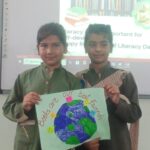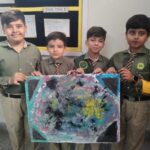Senior Section
At APSIS, we believe that a strong partnership between school and home is the cornerstone of a child’s success. The journey from Grade 1 to Grade 5 is one of remarkable transformation, most clearly seen in your child’s relationship with the written word and the world of numbers. Understanding this journey helps us work together to support their growth every step of the way.
The First Major Transition: From Kindergarten to Grade 1
The step into Grade 1 is a significant and positive milestone. The most critical shift you will observe is the beginning of formal instruction in both literacy and mathematics.
- Literacy Focus: Cracking the Code (Learning to Read). The primary goal is to master the alphabet code—turning letters into sounds and sounds into words.
- Mathematics Focus: From Counting to Calculating. The focus shifts from recognizing numbers and simple counting to understanding place value and performing formal addition and subtraction.
- What to Expect: You will see a strong emphasis on phonics and sight words in reading. In math, your child will move beyond counting objects to writing and solving number sentences (e.g., 5 + 3 = 8). The use of visual aids and manipulatives remains central.
- Our Approach: Our Grade 1 teachers are experts in making this transition smooth and joyful, building confidence in these foundational skills.
The Key Stages of Growth in Grades 1-5
Stage 1: Building the Foundation (Grades 1 & 2) - Mastering the Tools
This stage is dedicated to achieving fluency in the fundamental tools of learning: reading and arithmetic.
- Literacy Focus: Mastering “Learning to Read.” Your child will move from laboriously sounding out words to reading with growing fluency and comprehension.
- Mathematics Focus: Achieving Computational Fluency. Students develop “number sense,” mastering addition and subtraction facts and understanding place value up to hundreds. They are introduced to concepts like measurement, simple geometry, and the beginnings of multiplication.
- What to Expect: You’ll share the joy of hearing your child read their first books independently. In math, you’ll see a focus on memorizing basic math facts and solving one-step word problems.
- Our Role: We ensure every child has the tools to become a proficient reader and a confident, flexible problem-solver with numbers.
Stage 2: The Pivotal Shift (Grades 3 & 4) - Applying the Tools
This is the critical academic transition of primary school. The focus changes from acquiring skills to applying them in more complex ways.
- Literacy Focus: The Shift to “Reading to Learn.” Reading becomes the vehicle for learning all other subjects. Comprehension skills like inference and summarization become paramount.
- Mathematics Focus: The Shift from Arithmetic to Mathematics. Students move from simple calculation to complex application. This includes mastering multiplication and division, and working deeply with fractions and decimals. The biggest change is in multi-step word problems that require critical thinking and reasoning.
- What to Expect: You will see textbooks and informational articles become central to learning. In math, homework will involve problems that require several steps to solve. This is when a strong foundation in reading and math facts is essential for success.
- Our Role: We intentionally design our curriculum to challenge students with complex texts and problems. We explicitly teach strategies for comprehension and mathematical reasoning to ensure students successfully cross this pivotal bridge.
Stage 3: Growing Independence & Critical Analysis (Grade 5) - Thinking with the Tools
Grade 5 is a capstone year where students consolidate their skills and emerge as independent, critical thinkers.
- Literacy Focus: Synthesizing and analyzing. Students use reading to form and support their own opinions, conduct research, and write evidence-based essays.
- Mathematics Focus: Abstract Reasoning and Application. Math becomes more abstract. Students solidify operations with fractions and decimals and are introduced to the foundational concepts of algebra (e.g., using variables) and geometry (area, volume). The emphasis is on applying mathematical concepts to solve real-world problems.
- What to Expect: Your child will be expected to learn new material independently. In math, they will solve complex problems that integrate several concepts (e.g., using fractions and geometry together). Your role evolves into a discussion partner, asking questions that prompt deeper thinking.
- Our Role: We prepare our fifth graders for middle school by fostering intellectual curiosity and critical analysis in both literacy and mathematics, creating truly autonomous learners.






Our Partnership with You
The parallel journeys from “learning to read” to “reading to learn” and from “counting” to “mathematical reasoning” are the academic backbone of primary education. At APSIS, our curriculum is meticulously designed to guide your child through each stage. We are committed to ensuring that by the time they leave Grade 5, your child is not just a skilled reader and mathematician, but a confident, critical thinker, fully prepared for the challenges ahead.
We welcome the opportunity to partner with you in this incredible journey.
This version successfully:
- Creates a Parallel Narrative: It clearly shows the symbiotic development of literacy and math skills.
- Uses Parent-Friendly Language: Terms like “from counting to calculating” and “from arithmetic to mathematics” are intuitive and powerful.
- Highlights Key Math Transitions: It specifically addresses the critical shifts in Grades 3-4 (fractions, multi-step problems) and Grade 5 (abstraction, integration of concepts).
- Maintains a Reassuring and Expert Tone: It positions the school as a thoughtful guide through these essential academic milestones.
Grade 6 to O-I
The transition to Middle School marks a pivotal shift in your child’s educational journey. At APSIS, our Grades 6-8 program is meticulously designed to bridge the gap between primary learning and the demands of the Cambridge IGCSE curriculum. We foster a rigorous academic environment that champions critical thinking, scientific inquiry, and intellectual independence, all while grounding our students in the ethical, cultural, and national values that define our identity.
Academic Rigor and the Transition to Specialized Learning
Moving beyond the generalist approach of primary school, our Middle School curriculum emphasizes depth, analysis, and subject-specific expertise, creating a unique synergy of national and international standards.
- A Cambridge-Aligned Approach: Our pedagogy is rooted in the Cambridge tradition, which prioritizes a deep conceptual understanding over superficial coverage. Students engage with subject matter through critical analysis, evidence-based reasoning, and the mastery of core principles.
- Fulfilling the Single National Curriculum (SNC) with Excellence: We seamlessly integrate the comprehensive guidelines of the SNC, particularly in building a strong foundation in Urdu, Islamic Studies, and Pakistan Studies. This ensures our students are deeply connected to their national identity, history, and language, while the Cambridge framework elevates their learning with global perspectives and advanced critical thinking skills.
- Specialist Teaching & The Scientific Method: Students learn from expert educators in each discipline. We instill a rigorous, analytical mindset across all subjects, where students learn to formulate hypotheses, design investigations, and evaluate data, preparing them for the practical and theoretical demands of IGCSE Sciences.
- Building the IGCSE Foundation: The curriculum in these years is deliberately structured to build the sophisticated knowledge and skills required for IGCSE success. We focus on developing advanced writing techniques, complex problem-solving strategies, and the ability to engage with abstract concepts.
The Development of the Whole Child: Our Institutional Ethos
Academic excellence is seamlessly interwoven with character development, preparing students to be conscientious leaders.
- Eastern Values and Ethics: We foster a culture of respect, integrity, and community responsibility, reflecting the core values of our society.
- Informed Pakistani Nationalism and Global Citizenship: Our compliance with the SNC ensures students develop a profound and informed pride in their national heritage. This is balanced with an openness to and respect for other cultures, creating true global citizens.
- Intellectual Openness: Our classrooms are environments for enlightened discussion, where students learn to articulate their ideas thoughtfully and consider diverse perspectives.
Defining the APSIS Middle School Graduate
By the conclusion of Grade 8, a student from our community will have matured into:
- An Autonomous Scholar: Capable of managing a demanding academic schedule, conducting independent research, and taking full ownership of their learning.
- A Critical and Analytical Thinker: Equipped to deconstruct complex problems, evaluate evidence, and construct well-reasoned arguments.
- A Nationally-Grounded Global Citizen: Possessing a deep understanding of their Pakistani heritage and the confidence to engage with global ideas.
- A Prepared Candidate for the Future: Having developed the advanced cognitive skills that form the essential foundation for future academic challenges, including standardized tests like the SAT.






A Collaborative Partnership with Parents
This journey is a shared endeavor. We encourage you to:
- Foster Growing Independence: Transition from direct oversight to mentoring, guiding your child to develop their own organizational and time-management skills.
- Value Intellectual Curiosity: Encourage deep conversations about what they are learning, focusing on the “why” and “how” rather than just the “what.”
At APSIS, we are dedicated to shaping individuals who are not only exceptionally prepared for the academic challenges of IGCSE and higher education but are also grounded, ethical, and proud representatives of their culture and country.
Key Refinements:
- SNC Integration: The SNC is presented not as a separate burden, but as an integrated and valued component that strengthens the students’ connection to their national identity, specifically mentioning Urdu, Islamic Studies, and Pakistan Studies.
- Synergistic Approach: The text clearly states that the Cambridge framework elevates the SNC foundation, creating a unique value proposition for parents seeking both national grounding and international excellence.
- Maintained Prestige: The language maintains the high standards and aspirational goals of the institution while acknowledging the national educational requirements.
